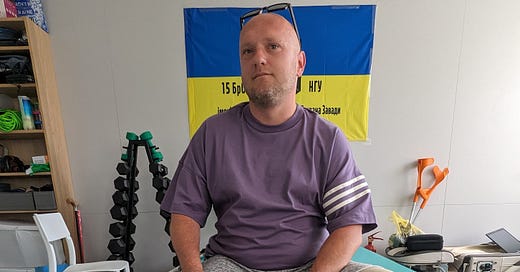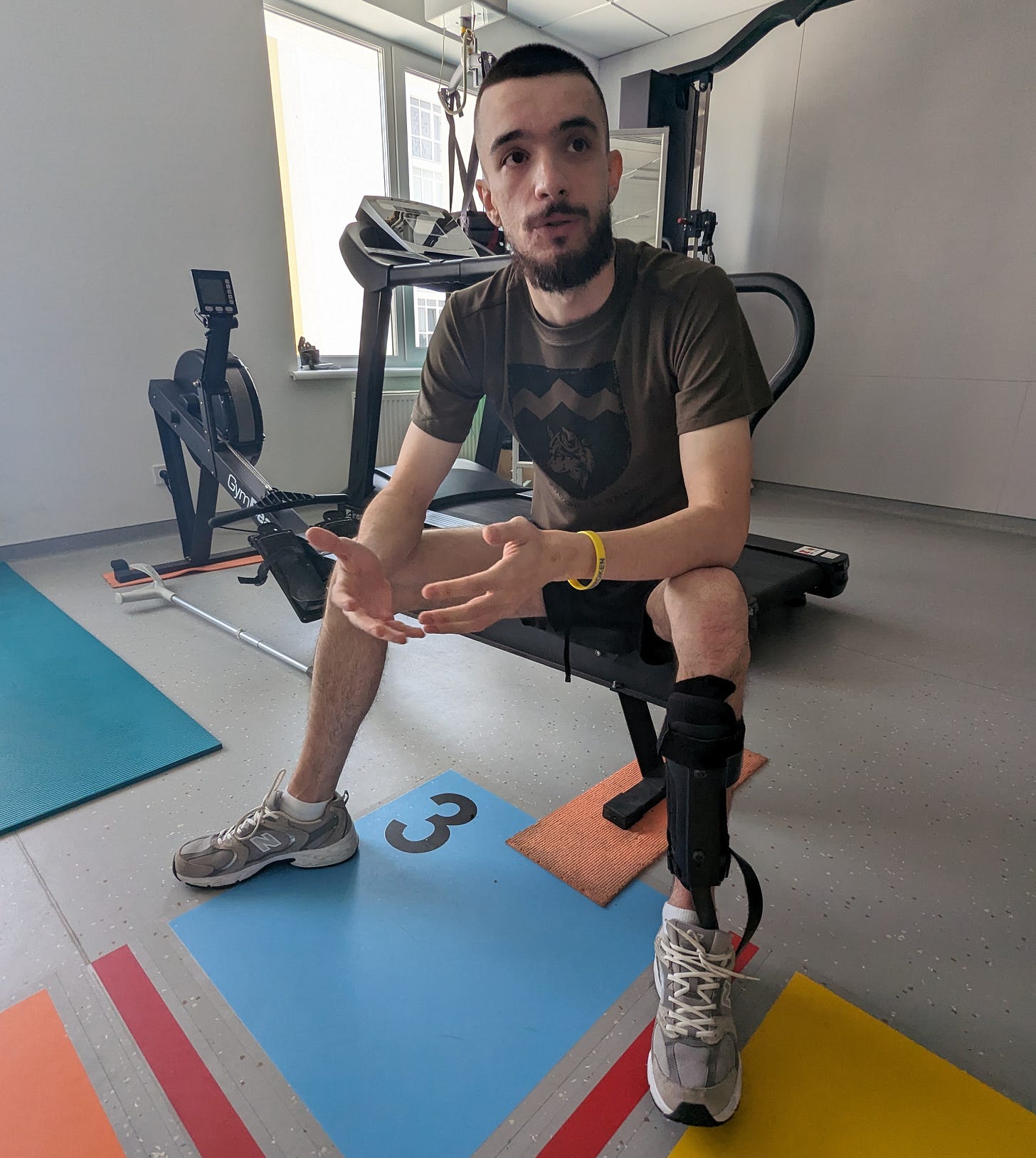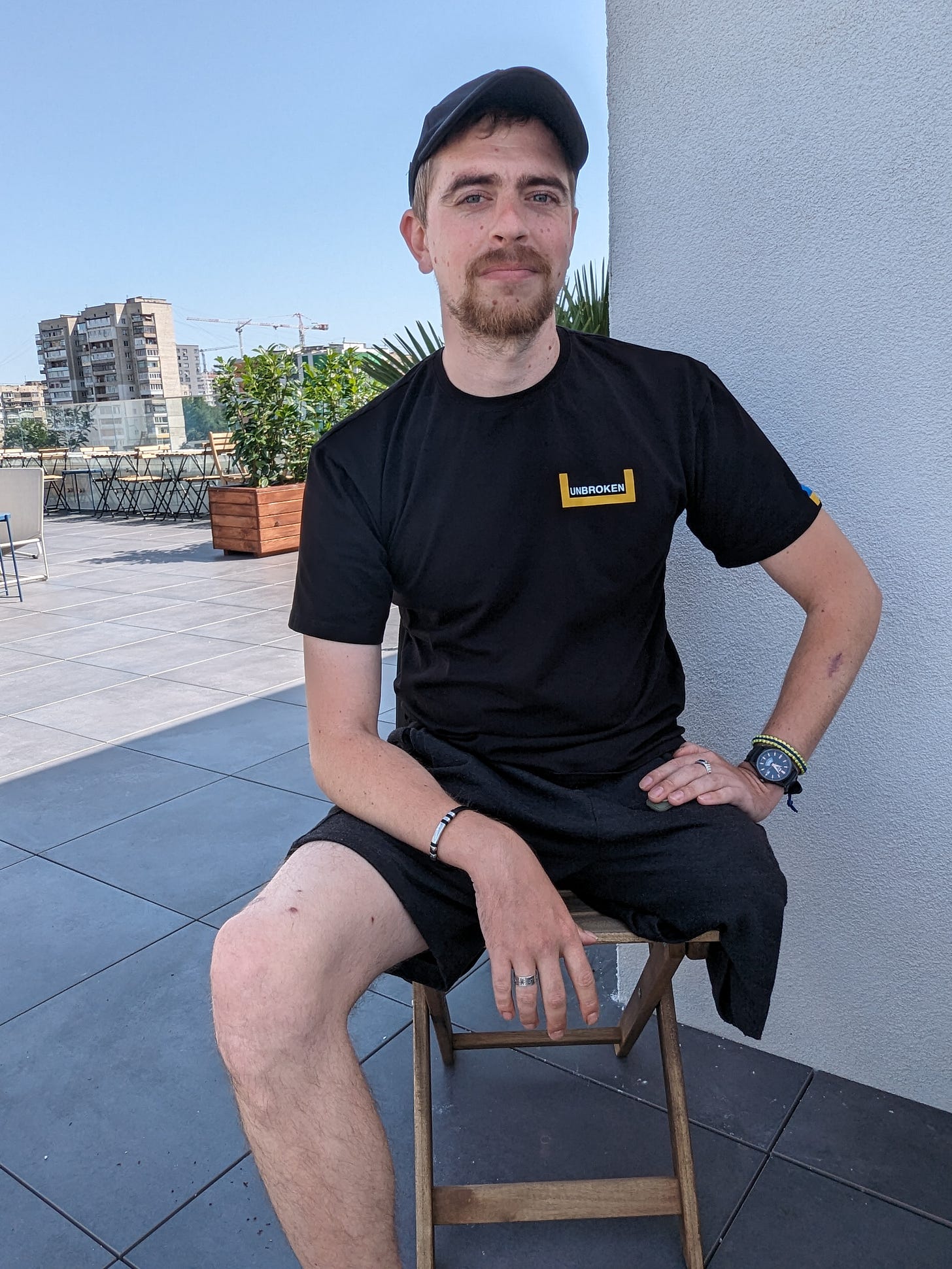A matter of sacrifice
What wounded soldiers think of Ukraine's struggle to attract new recruits
The five men on the mortar team picked their way across a wasteland of artillery craters and burned trees as they advanced toward a firing position. Ukrainian troops had reclaimed a patch of scarred front-line territory in the southern region of Zaporizhzhia, and as Russian forces shelled the area, the team edged forward, scanning sky and earth for threats. Drones could drop grenades from above; land mines could explode from below.
A Ukrainian demining crew had cleared a path through the terrain after Russian forces pulled back. Aware of the imprecision of clearing operations, the mortarmen and their commander, Viktor Andriyanov, knew they needed luck on their side. The soldiers moved with cautious urgency along the demined route, walking under tree cover before entering a small meadow. There luck deserted them.
The ground erupted beneath Viktor, blowing off his left foot and exposing the team’s position. As Russian rockets pounded down, the senior staff sergeant willed himself to stand and hopped on his good leg into the trees, collapsing in the brush. His soldiers cinched five tourniquets on his mangled limb as artillery and mortars ripped through the canopy. Hours passed and the sun disappeared. He accepted that death might arrive before a medevac crew.
Ten months and eight surgeries later, Viktor removed his prosthetic foot as we sat on the rooftop terrace at Unbroken, a national rehabilitation center for wounded troops located in Lviv. The blast last fall forced doctors to amputate his leg mid-shin, and he faces more surgeries to relieve constant pain from damaged nerves. Yet for all his trauma, he possesses a striking lack of self-pity, reassured by the belief that he shed his blood for a cause greater than his own life.
“Ukraine got independence without having to fight and die for it,” he said, referring to the collapse of the Soviet Union in 1991, when the country gained its freedom. “So now this is like our independence war, our war of existence. That means we have to sacrifice.”
Viktor Andriyanov lost his left foot when he stepped on a land mine in the southern region of Zaporizhzhia last fall. The senior staff sergeant is recovering at Unbroken, a national rehabilitation center for wounded troops located in Lviv, Ukraine. (c. Martin Kuz)
I had come to the center to ask soldiers wounded in service of their nation about the military’s struggle to attract recruits more than two years into Russia’s full-scale invasion. A renewed mobilization effort that began in May aims to counter draft evasion and replenish Ukraine’s exhausted infantry ranks. The campaign seeks to enlist an estimated 200,000 troops by year’s end as the country attempts to bolster its forces along the 700-mile front line, where a third of its 1 million troops serve.
I expected the soldiers recovering at Unbroken to disparage their fellow Ukrainians who refuse to take up arms. Those I met instead offered understanding for reluctant recruits and questioned the wisdom of the army’s enlistment push, even as they described a dire need for younger soldiers in a military with an average age of 43.
His combat duty now over, Viktor, 41, first signed up as a volunteer in 2014. Russian President Vladimir Putin started his invasion of Ukraine that spring, annexing Crimea and sending troops in unmarked uniforms into the southeastern regions of Donetsk and Luhansk to foment a separatist uprising. During his year in a sniper unit, Viktor survived a massive rocket attack near the Russian border that killed 37 Ukrainian troops, one of the deadliest episodes in the war’s first months.
He returned home to Lviv a year later and found work with the city parks agency. When Putin unleashed a wider invasion in 2022, Viktor re-enlisted without hesitation, joining hundreds of thousands of others who signed up nationwide. But the long lines outside military offices had vanished by last summer as Ukrainian casualties mounted and Western support wavered.
The government has responded with newly aggressive tactics to conscript more young men, particularly in Ukraine’s largest cities. Recruiters accost them at work, on the street, in cafes and subway stations. Viktor would prefer that the army trade coercion for persuasion to build a military of the willing.
“I think each person needs to make the choice about whether to be a soldier,” he said. “We should make an infantry with professionals, not just people we force to do it. We need people who are ready to fight. We need meat, not fat.”
Doctors spent hours removing shrapnel from Dmytro Vorozhko’s left leg after he was wounded in a missile attack in the Luhansk region last year. His reduced mobility will prevent him from returning to the front. (c. Martin Kuz)
Dmytro Vorozhko, 26, shared a similar perspective. The company commander suffered a severe leg injury in a missile strike late last year in Luhansk that wounded dozens of his unit’s soldiers. Doctors spent hours removing shrapnel to save his limb and implanted a device in his thigh that emits electrical pulses to ease pain and heal damaged tissue and nerves.
I encountered Dmytro as he sat on a rowing machine in an exercise room, where he works out multiple times a day to strengthen his wounded leg. When Russian tanks and troops poured over the border in 2022, he ditched his university studies in the eastern city of Kharkiv and rushed to a military office to enlist. Frustrated that his reduced mobility will preclude him from returning to the front, he lamented the shortage of young men in the infantry.
“People have families and jobs, so they have to make that decision. It’s their life. But if you want to live under the Ukrainian flag, I feel you should fight if you can,” he said. Still, he voiced doubts about the military’s tougher recruiting methods. The rigors of trench warfare had taught him that a soldier’s conviction — a willingness to bleed for the homeland — matters above all else.
“As a commander, you need warriors who want to learn,” he said. “I would rather have 50 people who know they want to fight than 100 who have been told to fight.”
A rocket-propelled grenade exploded near Olexiy Chevychko’s feet during a close-range battle in the Donetsk region in March. The intense fighting prevented his evacuation for 30 hours. (c. Martin Kuz)
Joining the army felt more like a reflex than a conscious act for Olexiy Chevychko, who left his job at a steel foundry at the war’s outset. He recalled that Russian troops had advanced within a quarter-mile of his home in the Zaporizhzhia region. “I had this feeling that my country — I have to save it,” he said. “It was natural.”
Olexiy, 30, belonged to a mobile anti-drone unit, and during a close-range battle in Donetsk in March, a rocket-propelled grenade exploded near his feet. The intense fighting prevented his evacuation for 30 hours. He wondered if he had held his wife for the last time.
Doctors later amputated Olexiy’s left leg at the hip. His gratitude for escaping death has fueled his strong recovery and eased the sadness of losing the camaraderie of his platoon. The decision to become a soldier had deepened his love for Ukraine, and though war had stolen a part of him, he viewed military service as both duty and privilege.
“We must defend what is ours,” Olexiy said. He walked on crutches down a hallway decorated with photos of wounded troops who had recuperated at Unbroken; all of them appeared older than him. He could understand the fear that stopped young people from signing up. He hoped they would realize that Ukraine’s future rests in their hands.
“Everybody here has freedom to make choices,” he said. “This is what makes us different from Russia. This is why we must fight.”
Etc.
— Citing the war in Ukraine, the International Olympic Committee banned Russia from taking part in this year’s Summer Games, which opened yesterday in Paris. But in a shameful exception, the IOC granted permission to 15 individual Russian athletes to compete under a “neutral” designation without their country’s flag or national anthem. Their presence insults the memory of the almost 500 Ukrainian athletes who have fought and died for their country during the invasion. In a poignant piece earlier this week, Jeré Longman, a veteran New York Times reporter, remembered one of them. His story illuminates the tragedy of Ukrainian gymnasts, swimmers and weightlifters whose lives have been cut short — and the injustice of allowing any Russian athlete to participate.
— My sincere thanks for reading. If you’re a paid subscriber, please share your thoughts below in the comments section. And if you’re not, I hope you’ll consider upgrading — paid subscriptions make this newsletter possible. You can also support my self-funded reporting here. Thank you.







He would have wanted to get involved with helping Ukrainians who had suffered these injuries.
Mike O’C would have enjoyed this piece